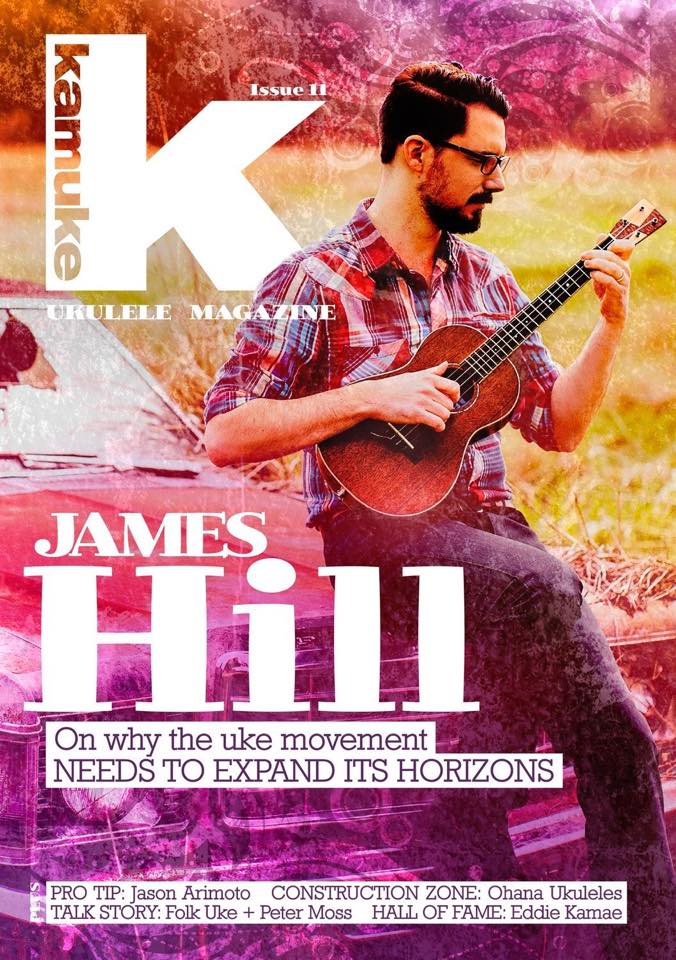
I noticed this headline on social media and so I also posed this question on the OUS FB page as well as my own personal FB page. I have not read the article as Kamuke is a hard copy magazine from Australia and as far as I can see there is no digital copy available! However I do agree with this quote mentioned on social media from the article –
“I think we need to move beyond the default ‘ukulele revolution’ narrative we hear so often in the press. That’s a well worn path that has lost a lot of its lustre. There are tons of other things to tak about: songwriting, cultural collaboration, social impact, health benefits, music education, uke history, new works for the instrument and so much more. We have happily pigeon-holed ourselves for a long time because it was to our advantage. But I finally see that coming to an end.”
I totally agree with the pigeon hole observation, ukulele music often and uke performers (not always) are also seen as a gimmick inevitably limiting any wider appeal to the wider public.
I Love the Ukulele
 Let me start by saying I love the ukulele and I have met some amazing players and individuals in recent years have written and recorded 30 songs inspired by the uke. I have written and volunteered many articles for Uke magazines, sponsored uke stages and charity events, set up and funded OUS for other artists and given a lot of free consultancy advice to uke event promoters.
Let me start by saying I love the ukulele and I have met some amazing players and individuals in recent years have written and recorded 30 songs inspired by the uke. I have written and volunteered many articles for Uke magazines, sponsored uke stages and charity events, set up and funded OUS for other artists and given a lot of free consultancy advice to uke event promoters.
I’m also aware that some blog articles have ruffled a few feathers when I have asked what I call “the elephant in the room” questions. I make no aplogies for this, I think we learn from honest discussion and debate. In my view the ukulele has so much more potential for creative expression, IF you want to expand such horizons. If you don’t, (which is 100% fine) then don’t attempt anything new in terms of playing, education, booking new artists and it is probaby best to stop reading now.
Ukulele audience expansions?
The original idea with OUS was to work with established ukulele concerns to promote original uke based music, but I soon realised that there’s too much of a gap in thinking, so I have pulled sponsorships. Many festivals in the uke world adopt the book as many artists as possible to sell as many tickets as possible to the public. Whole events are essentially an open mic style situation, rather than an actual musical event. This is fine, but not a great fit with OUS which is about finding appreciative listening audiences for ukulele music. This is a trend among festivals and there’s currently some backlash against this which I blogged about previously. I applaud anyone trying to promote music but as James suggests I think its time to expand horizons and that means new thinking.
I’m personally not a fan of the novetly aspect often associated with ukulele music, unless its done really well, which is often not the case. I was talking to a longstanding music promoter last year about this issue and he was amazed that there was even an audience for people wanting to listen to ukulele music. The reality from what I see and hear is that the enthusiasm for attending festivals and events is mostly for playing, not for listening to others. (see previous blogs on this, including surveys that point this out. Most UK ukulele music festivals will attract just a few hundred enthusiasts and its often the same audiences and artists that will travel to each event. This doesn’t make them any less a fun experience, but its a very niche audience and makes for quite a commercial challenge.
In 2018 there are more ukulele festivals than ever and this calendar shows this – http://www.gotaukulele.com/p/ ukulele-festival-calendar_11.html Many such events are social meet up ocassions and artists have consistantly complained that attendees would rather go off to have mass strums rather than listen to performers. Nothing wrong with that but it will IMO effect the longevity of such events
One ukulele music festival organiser even insisted that a uke audience’s concentration was only a maximum of 20 minutes, so all sets were subsequently limited to artists playing just a few songs. This restriction makes for a very hyperactive dynamic which doesn’t create the best listening entertainment in my view which can be a turn off for many music lovers. My own polls I blogged about previously suggest that 30 minutes would be far more attractive for both audience and performers. That may sound like a tiny expansion, but as all artists know there’s a world of difference in what you can do with 33% more time. Of course if the overal frame is like an open mic, then such considerations really don’t matter.
Ukulele music expansions?
I set up the Original Ukulele Songs (OUS) a few years ago as there seemed to be a genuine lack of original ukulele based songs. To my delight OUS has showed that there are some really great creative artists out there. A high proportion are solo performers of course. For me often the most interesting acts are duos or groups. The ukulele has a very distinct sonic range, even if you account for the different sizes of the instrument. When playing live I mostly use a tenor and a baritone ukulele which cover most bases. Adding other instruments like double bass, percussion and violin, really expand the sound. My main band “The Small Change Diaries” has a particular sound, so although at times two of us play ukes, I would certainly never call ourselves ‘a ukulele band”
The good news is that there are a few individuals who are really promoting ukulele musical explorations. The ones that immediately spring to mind are Phil Doleman who wrote a superb book that appeals to all levels of player, James Hill and Manitoba Hall with his videos. Del Ray also has a number of excellent videos, but these are the exceptions to the rule. Elsewhere the social strum along is very much the norm.
Ukulele instrument expansions?
The first ukulele I bought was a Collings concert pre production ukulele, which I still have and love. Bill Collings makes the best instruments and I was lucky enough to interview him before he passed a few years ago. I’m also a massive fan of Takahiro Shimo’s work and almost always only record with his instruments. Pete Howlett also makes great ukuleles. These are in my view great examples of ukulele instruments as opposed to “uke shaped objects” Shimo in particular is pushing the boundries of ukulele construction and I am lucky to have a really good connection with him.
There are also many “ok” ukuleles and a huge number of really horrible uke shaped objects that can’t really be described as playing instruments. Social media FB groups are full of people asking “What’s the best uke?” which of course is a supremely daft question when asked without any qualification. There are crazy numbers of reviews onlline on very average ukuleles. The good news is that many such items are quite affordable, but all too often are very limited sonically and often not that great to play.
Conclusion
I don’t think “the uke movement” needs to do anything, but I do think there is a bigger opportunity to take the instrument and music to a wider audience. Of course such expansions are not in everyone’s commercial and creative interest. There remains an enthusiasm for ukulele events, but it looks like the same niche audience in attendance and of course some major ones have disappeared in recent times.
Many instrument builders are building to a price point and many event promoters are simply giving a small group of enthusiasts what they expect. If “the uke movement” (I’m not sure if a single movement or uke community actually exists, but that’s a whole different blog) is to expand, then it requires the collective will to make this possible and a more radical way of thinking. I’d love to think this is possible, but I can’t see it happening in the immediate future. That said, I applaud James asking the question and OUS will continue to promote the creation of new uke based songs. The music market is changing and its going to be even tougher times for niche music, especially magazines. As I write this I hear that the well established “Acoustic Magazine” is folding after this April issue due to lack of advertising revenue. In the instrument world Gibson is also on the verge of folding, but that to me is unsurprising given the management of that business.
Everyone will have their own subjective opinion on what will happen with “the ukulele movement” and I’m a big advocate of discussion and debate. That’s essential if those in the uke movement have a genuine desire to expand their collective horizons about what may be possible. Either way, I think its an interesting discussion worth having, even if it inevitably stirs up some strong opinions from folks who favour the status quo.

